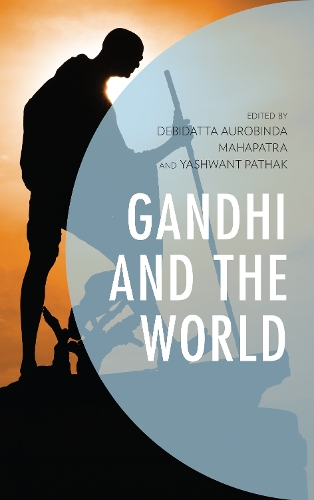
Gandhi and the World
(Hardback)
Publishing Details
Gandhi and the World
By (Author) Debidatta Aurobinda Mahapatra
Edited by Yashwant Pathak
Contributions by Debidatta Aurobinda Mahapatra
Contributions by Yashwant Pathak
Contributions by Johan Galtung
Contributions by Abdelwahab Hechiche
Contributions by Frank M. Tedesco
Contributions by Ananta Kumar Giri
Contributions by Richard Grego
Contributions by Anna Hamling
Bloomsbury Publishing PLC
Lexington Books
20th June 2018
United States
Classifications
Professional and Scholarly
Non Fiction
East Asian and Indian philosophy
Politics and government
303.66
Physical Properties
Hardback
208
Width 159mm, Height 239mm, Spine 20mm
445g
Description
The book revisits Gandhi in this era of turbulence. As rigidly held notions and practices fall to pieces, and as mechanisms of violence and politicking fail, Gandhi comes to picture. If Gandhi could change the course of history, there must be elements in his thought and action, which need re-examination for the benefit of human society. This collection of essays seeks to address the question: Is it possible to generate Gandhian optimism and faith in truth and nonviolence in the contemporary world It argues that there is a need for sustained efforts to make an in-depth study of Gandhian principles to address global problems. The book is a useful addition to the literature in political science and international relations, economics, history, sociology, conflict and peace studies, and a guide for the advocates of peaceful means of conflict resolution.
Reviews
"A stimulating collection of essays that explore and reflect on Gandhis continued relevance to a wide range of social and political tensions in the twenty-first century." -- Neil Jarman
"The book is a principled assault on current traditions of international relations. The declining power of states to protect people or address global problems beyond the power of national states to solve alone, like climate change, necessitates, argues Mahapatra, new mechanisms that transcend state foci on territorial integrity, sovereignty, and dominance of other states. His mechanisms are human security, world citizenship, international norms, global popular action. He cites current difficulties to resolve the civil war in Syria or to arrest fraying U.S. relations with Russia. Nothing concrete on the Israeli-Palestinian conflict, ISIS, or Boko Haram. His best example is his own work with Kashmiri militants. He could have mentioned the fall of Communism after 1989. Mahapatra does not come to grips with big international problems, for which most people would think humanitarian intervention (use of military force, if possible with U.N. mandate) is necessary. Even Gandhi conceded that, if the choice is between cowardice and violence, he would advise violence. The many believers in Gandhian nonviolent methods have a long struggle ahead. Gandhis methods worked to free India from the British, but where else in the anti-imperialist struggle Not in Algeria. Not in Kenya. Not in Zimbabwe. Not in Vietnam. Why has Indias economic development not followed in his vision of Sarvodaya villages, self-regulated, linked in oceanic circles Hence the focus of IR scholars on power as it is currently exercised. Even a federation of the world would only unite force in the common defense. Very slowly, beginning now in the global South but extending for hundreds of years, Gandhian values, including Eastern moral values, should spread throughout world society." -- Joseph Barratta
Gandhis relevance in this age of crises and multi-level conflicts is beyond question. This book is a precious guide to the world of the apostle of truth and nonviolence, providing a deep insight into the Gandhian methods marvelously linked with real life situations. The framework derives from the awareness that contemporary world has increasingly witnessed strenuous relationships between moral and ethical values, and their practice: recent conflicts depict a more polarized and violent world. Gandhis principles based on nonviolence as the only strategy for conflict prevention and resolution acquire today a new and innovative value. This book has elaborated an interpretation that gives an answer to the much needed and demanded correct and effective connection between action and values. This stimulating book takes the reader by the hand along an exciting intellectual path in which the Gandhian message emerges in all its significance not only for the construction of our present, but more importantly, for the future. -- Emanuela C. Del Re
Author Bio
Debidatta Aurobinda Mahapatra is the director of Mahatma Gandhi Center for Non-Violence, Human Rights and World Peace at Hindu University of America. Yashwant Pathak is professor and associate dean for faculty affairs at the College of Pharmacy, University of South Florida (USF).
